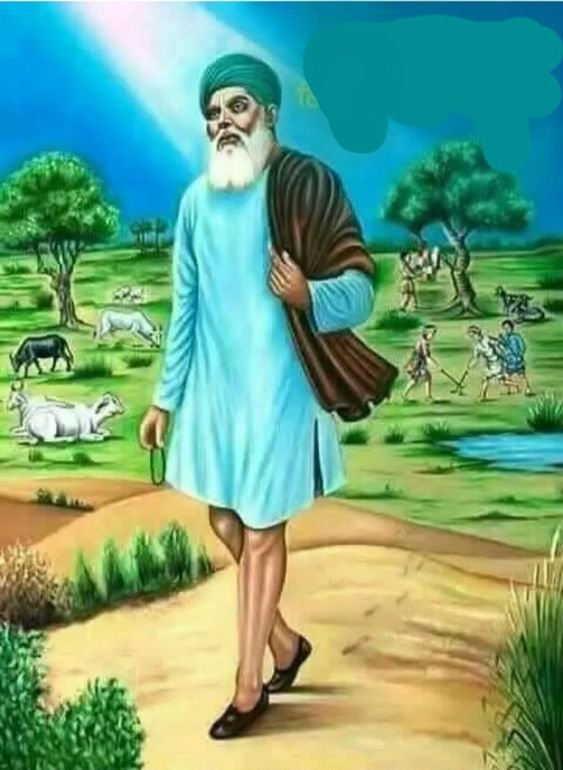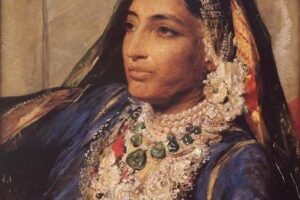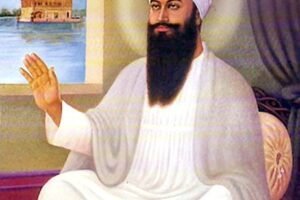Sheikh Farid
Sheikh Fariduddin Masud, popularly known as Sheikh Farid or Baba Farid, was born in 1173 AD at Kasur. His father, Jamaluddin Suleiman, belonged to an aristocratic family of Kabul, but had moved to Lahore and then to Kasur because turbulent conditions prevailed in Afghanistan. Farid’s mother, Qarsum Bibi, was a God-fearing woman of great wisdom and took upon herself to educate young Farid. She is also considered responsible for his mystic outlook and his urge to seek a Master.
As a young man, Farid moved to Multan and then to Pakpattan, ‘the place of purity’. He wrote poetry in Persian and Punjabi. His poetry in Punjabi was largely responsible for his wide fame. This was also because the Qawals sang his poems, which made him very popular. His salokas were admired because of their brevity, verve and sharp wit. Moreover, it was his mystic outlook that made him a part of the mystic Sufi tradition of saints, who ruled the hearts of the people during that period.
Sheikh Farid often made journeys to Delhi to meet his Murshid (the Guru) Qutubuddin Bakhtiyar Kaki, who lived near Mehrauli. Moreover, Farid had his disciple, Nizamuddin Auliya, also living in Delhi. In fact Qutubuddin Bakhtiyar Kaki was himself a disciple of Pir Moinuddin Chisti of Ajmer. Thus, the region of Punjab was in a way, ruled by the Sufi saints, who were admired and worshipped by the common people.
The sway of the Sufi saints in Punjab did not have anything to do with the political turmoil that was being witnessed. Sheikh Farid was a boy when Mohammad Ghori invaded India and made Lahore and Multan part of his empire. Farid was in his thirties when Mohammad Ghori died. He was in his forties when Jhingiz, the Mongol, who advanced into Afghanistan and Punjab, invaded India. Farid witnessed the goings on of the Delhi Sultans, who were taking turns to run the administration of the territories around Delhi. He was in his nineties when Balban ascended the throne in Delhi. It is believed that he came to Pakpattan to seek Sheikh Farid’s blessings before assuming the throne. Farid witnessed so much turmoil, but all this did not disturb him since he was immersed in his mystic world and continued the life of a great poet and a modest, simple saint.
Sheikh Farid is perhaps the earliest to write poetry in Punjabi. He uses chaste Punjabi with a touch of Multani dialect. Being a mystic, his poetry speaks of mystic love and adoration of the Lord. He expresses his feeling in laconic wit with a mixture of irony and romantic imagination. At places his expression has the ruggedness of Punjabi character.
His non-conformist poetry, however, is in sharp contrast to the religious fanaticism prevailing in the country. He sings the pain of separation from his master and agonizing craving to meet him. He also talks about the ultimate knowledge that He dwells in one’s own heart, though this knowledge comes only through the grace of the Murshid.
When Guru Nanak visited Pakpattan, Sheikh Ibrahim was the head of the place being the eleventh in line of succession.
Sheikh Ibrahim and Guru Ji had great regard for each other. Therefore, Guru Ji visited Pakpattan a number of times.

According to Janamsakhi, Sheikh Kamal, a follower of Sheikh Ibrahim was collecting wood for the kitchen. He heard Guru Nanak sing:
Aape patti kalam aap upper lekh bhi toon
Eko kaheeay Nanaka dooja kahe koo (1291)
Thou thyself are the wooden table, Thou thyself are the pen, Thou thyself are the writing on it, Why the one should be called another, Nanak.
When Kamal heard this, he left his work and came to listen. He requested Mardana to repeat the hymn for him. Having remembered he came to Sheikh Ibrahim and narrated the hymn, saying it was by Nanak. Sheikh Ibrahim said that he had known Nanak. “Let us go and meet him”. Guru Nanak and Sheikh Ibrahim were very pleased to meet each other.
Guru Nanak had taken the hymns of Sheikh Farid from Pakpattan and had kept these along with his own writings and the writings of other contemporary saints. He had passed these on to Guru Angad and in turn Guru Arjun collected and ultimately included these in the Holy Guru Granth Sahib.

| Some of the salokas of Sheikh Farid are given below: Farida je toon aqal lateef, kale likh na lekh Apnarre giriban mein, sir neevan kar dekh Wisdom decries censure of others. Lower your gaze to look into yourself. Birha birha akheeye, birha too sultaan Farida jit tan birha na upjae so tan jaan masaan The pain of separation rules: Where separation does not torture, there mind and body are ground for pyres. Utth Farida uzu saaz, subhau niwaaz guzaar Jo sir Saayeen na nive, so sir kapp utaar Day-break and prayer-time calls: It were best that head should fall which does not bow before the Lord. Kaga kurang dhandoliya, sagla khayo mass Eh doe naina matt chhoeyo, Pir dekhan kee aas Feast, crows, on my wasting flesh, But leave, I pray you, my eyes that I may see my Master |













